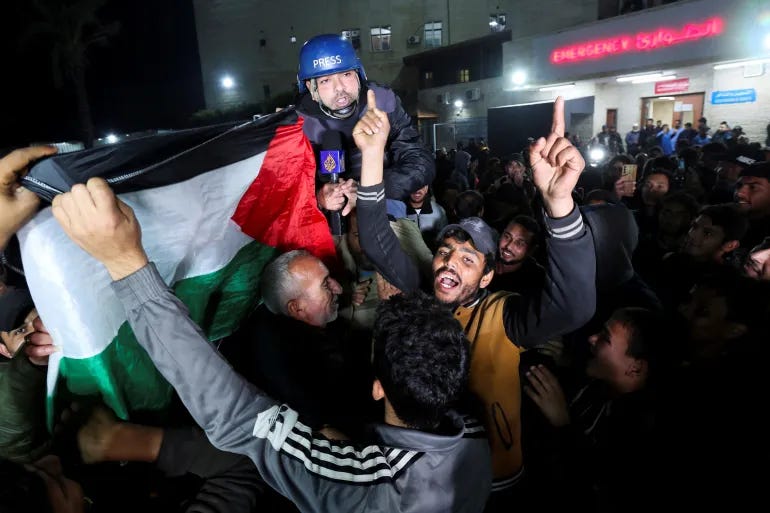Ceasefire in Gaza: A Momentary Calm in the Face of Persistent Struggles
A fragile ceasefire offers temporary relief, but questions about lasting peace and justice remain unanswered.
The announcement of a ceasefire agreement in Gaza marks a pivotal moment in the ongoing conflict, providing a brief respite in a war that has spanned 15 months. For those of us who have lived through, witnessed, and advocated from a distance, this fragile calm gives us a moment to reflect on the immense cost that brought us here, as well as the uncertainty that lies ahead.
As a Palestinian, receiving this news feels like standing in the eye of a storm—an eerie stillness surrounded by chaos and devastation. While this ceasefire may signal the end of bloodshed for now, the truth remains: the lives lost cannot be returned, and the scars will never fully heal. How can a ceasefire ever change these immutable facts?
Ceasefires are often celebrated as diplomatic triumphs, but for many of us, they are merely temporary pauses in an ongoing nightmare. This latest agreement, reached under intense international pressure, provides critical relief, including a halt to air strikes, rocket fire, and provisions for humanitarian aid. While these measures are essential, they also serve as a stark reminder of the global community’s failure to act sooner to prevent such crises. Aid is vital, but it cannot heal the deep wounds of systemic oppression. Temporary peace cannot replace the fundamental right to live freely, beyond mere survival.
The International Court of Justice (ICJ) and the International Criminal Court (ICC), with their arrest warrants for those responsible for crimes against our people, stand as symbols of the world's failure to act. Will these institutions pursue justice once the fighting ends, or will the calls for accountability be drowned out by political indifference and bureaucratic inertia? The international community's failure to enforce justice before, during, and after the conflict highlights the inherent flaws in these systems.
The need for aid is undeniable, but no amount of assistance can undo the legacy of oppression that continues to ravage Gaza. Temporary peace cannot substitute for the right to live without fear, to dream beyond survival. This raises another critical question: Will Palestinians ever gain full control over their political destiny and pursue justice on their own terms? Or will we remain sidelined in a global conversation where our voices are minimized, and our plight framed as a perpetual victimhood?
For Palestinians, especially those in Gaza, the blockade is its own form of violence. The 17-year siege has eroded the very foundation of life in Gaza, stripping families of opportunities and denying them their most basic rights. How do we rebuild when our reality is one of constant struggle, knowing that this ceasefire may collapse as quickly as it arrived? How do we dare to dream of a future when the present feels like an unending cycle of mourning?
During the war, actions like the suspension of funding to the United Nations Relief and Works Agency for Palestine Refugees (UNRWA) exacerbated the humanitarian crisis. The failure of the international community, including the UN and other global powers, to intervene in time to restore vital lifelines further highlights its failure to uphold humanitarian law and protect civilian life. What happens when the safety nets, already fragile, are removed without resistance strong enough to alleviate the suffering?
The international community, especially Western powers, must confront their complicity in perpetuating this cycle. Statements of support for ceasefires are hollow if they are not matched by meaningful action, accountability, civilian protection, and a genuine commitment to addressing the root causes of the conflict. The imbalance of power, the harsh reality of occupation, and the suffocating blockade are not side issues—they are the heart of the problem.
How can we trust the US administration, led by President Joe Biden and soon to be succeeded by Donald Trump, to broker peace when their policies have consistently undermined it? Decisions such as the relocation of the US embassy to Jerusalem and the recognition of the Golan Heights as part of Israel show an agenda that prioritizes power over justice. And the fear remains that the same policies of violence and displacement will extend to the West Bank. These actions prove that a ceasefire does not equate to a shift in policy or priorities.
As I process this moment, I feel both a flicker of hope and a surge of anger. Hope that this brief pause may save lives, and anger that it has taken so much suffering to reach even this fragile moment. The world’s attention will soon shift, but for us, this is not an end. Ceasefires are not peace—they are simply moments of calm in an unending storm. Until justice is served, until dignity and equality are more than distant dreams, the cycle will continue.
This is not to diminish the significance of the ceasefire for those whose lives hang in the balance. For many, it is the difference between life and death. But as a Palestinian, I cannot ignore the deeper truth: peace is not the mere absence of war. It is the presence of justice. It is the freedom to live without fear, to rebuild without the threat of destruction, to dream beyond survival. Anything less is not peace—it is survival. And survival is not enough for a people who deserve so much more.


